Patience Revisited

Patience is a solitaire game for Palm OS devices. It supports the latest
Palm OS 5 devices all the way back to Palm OS 2.0! It has been upgraded to
support useful features of the more recent devices: color, high resolution
mode, and larger screens. It comes with a wide variety of one- and two-deck
games, including FreeCell, Klondike, Canfield, Spider, Montana, and many
more (see below for the full list).
All of the games have the same controls; most of the time tapping on a card
will move it a useful manner. When that doesn’t do what you want, you
can always drag a card where you want it to go. Helpful Hints and 1024-level
undo are always available.
Download the latest from the
SourceForge project download page.
Also see the SourceForge
project page
and the SourceForge
home page.
Visual features include:
-
Supports high resolution and devices that can hide the graffiti area for an
even larger screen. Also supports portrait and lanscape modes (screen
rotation, where supported by the device).
-
The top card is drawn with a larger, centered suit bitmap (preference).
-
Greyscale and color allow for prettier suits. B&W mode can be
forced with a preference.
-
If necessary, the “10” rank is drawn narrower, to avoid
exceeding the card boundary or overlapping the suit graphic.
-
Builds are highlighted, by compacting them vertically, and (on OS 3.5 and
up) shading them grey.
-
The background is drawn in a solid green color (the pattern can be restored
with a preference).
-
The cards are drawn with a border in all games (Montana and Spider, for
example), and with rounder corners.
-
New color (
 )
and monochrome icons (
)
and monochrome icons ( ),
including a small/list icon (
),
including a small/list icon ( ).
).
New in 5.1:
-
Add support for mapping hardware buttons to game actions. Buttons include
the standard up/down and date book, address, todo, and memo buttons, as well
as the 5-way controller buttons, if present. Game actions include Undo, Hint,
Examine, Deal, Another Hand, New Game, and Restart Game.
-
Create preference for game variant options (Golf 4-row vs 5-row, Klondike
1-card deal vs 3-card).
-
Add a preference to ask for confirmation before starting a new game.
Helpful if you accidently draw a ‘m’ (which would quit your
current hand and start a new one).
-
Add a preference for suit colored rank labels (i.e., red for hearts and diamonds, black for spades and clubs).
-
Improve distinctness of clubs vs. spades on low resolution screens
-
Updated the description of Towers to more accurately describe the game.
-
Change “Another Game” menu item to “Another Hand” to avoid confusion
-
A few minor improvements for non-volatile RAM PalmOS 5 devices.
-
Implement a new random number generator, which should make the games a
little more, well, random. The existing algorithm had a flaw that made
roughly 1 in 16 games contain a non-random sequence. This changes the
“game numbers,” but the “Select Game Number” form
allows specifying game numbers compatible with Patience 5.0.
-
No new games (no room on the game selection screen! :-)
-
Note: Version 5.1 removes the special support for HandEra
models (1.5x screen resolution). The HandEra bitmaps made the application
larger, the 1.5x is a special case, and there are few HandEra users still
out there. If you are a HandEra user and want support, please write me.
-
Bugs fixed:
-
Tungsten models redraw correctly after a win.
-
Removed multiple redraws in many cases, general tidiness fixes to conform
better to Palm UI guidelines. Many small visual enhancements.
New in 5.0:
-
Support for Palm OS 5! Supports the latest devices, including Palm®
LifeDrive™ mobile managers, Treo™ smartphones, and
Tungsten™ and Zire™ handhelds. Continues support for other Palm
and Sony models.
-
Three new games: Baker’s Dozen, Gypsy, and Terrace.
-
New hint logic to suggest the best move out of all possible moves
(the old behavior was to take the first move of any type).
-
Support “game numbers” so you can replay a given game. The game
number identifies the initial “deal” (shuffle or card layout).
For a given game number, the cards will play in exactly the same order,
allowing you to play the same game at a different time or to compare with a
friend. For FreeCell, supports the same game numbers as Windows FreeCell (see
below).
-
Added a menu and shortcut for “Another Hand”, that is, shuffle
the cards and play another deal of the game you are currently playing.
Shortcut is ‘m’ (for “saMe”; ‘s’ is
already used to reStart the current game without shuffling).
-
New entertainment when you win.
-
Added a new song (Pop Goes the Weasel).
-
Updated game rules, adding tips for many games.
-
Patience Revisited is released as open source under the Artistic license
(which to the best of my knowledge is compatible with Keith Packard’s
license). Visit the SourceForge project page at
http://sourceforge.net/projects/palmos-patience.
-
Changes to specific games:
- Canfield, Eight Off, Picture Gallery: Show a reminder for which card
fills certain empty card spots.
- Spider, Tarantula: Major upgrade to hints—if the move is not in suit,
suggest the highest rank, and when moving piles, suggest the move that would
make the largest combined (in-suit) stack.
- Golf: Change initial deal back to 4 rows :-)
- FreeCell: Use a different random number generator to match Windows game
numbers. For example, game #11982 is impossible (but all others from 0 to
32,000 are solvable)!
See
http://www.solitairelaboratory.com/freecell.html
for lots of details on FreeCell game numbers, including an excellent
FAQ.
New in 2.6.2:
-
Added six new games: Forty Thieves, Miss Milligan, Picture Gallery, Royal
Cotillion, Stalactites, and Tarantula.
-
Added face card graphics
 for high resolution. Some of the new games
feature face cards prominently (Picture Gallery, Royal Cotillion) so it
seemed appropriate to add them. See the high resolution screen
shots for an example.
for high resolution. Some of the new games
feature face cards prominently (Picture Gallery, Royal Cotillion) so it
seemed appropriate to add them. See the high resolution screen
shots for an example.
-
If you are artistically inclined, the source images are included if you feel
like experimenting. Contact me for card width information.
-
Fixed a problem selecting the background pattern in black and white mode.
-
Minor tweaks to layout and some game rules:
-
Golf: initially deal 5 rows dealt instead of 4
-
Klondike: in rare situations a hint wasn’t suggested
New in 2.6.1:
-
By popular demand: statistics! Patience now keeps track of wins
and losses (a loss is defined as starting a new game without
winning—not always a real loss, but it’s the best I can do).
-
HandEra 330 support Removed in version 5.1.
-
Added preferences to allow configuring the up/down buttons to choose from
undo, hint, examine, and deal.
-
Added support for jog dial (up/down are the same as the up/down buttons,
click is configurable).
-
Fixed greyscale high resolution graphics.
-
Fixed the code that plays a tune when you win, and added a volume preference.
-
Thanks to Greg Koker for helping me test these improvements!
Known problems:
-
Sometimes the screen redraws multiple times when moving between forms.
-
No time to work on patience :-)
If you want to report problems or have suggestions for improvements, you can
contact me at
pdclose@yahoo.com. I can’t
promise to respond very quickly, since this is all done in my spare time,
and sometimes I have less spare time than others :-) If you have a favorite
solitaire game that’s not here, let me know, it’s relatively
easy to add new games….
Here are some screenshots to give you an idea of the new look.
There are also high res
screenshots on a separate page, due to their size.
|
Patience 2.52
|
|
Patience Revisited
|
|
Mono
|
Greyscale
|
Color
|
| Tabby Cat |
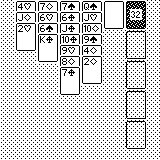 |
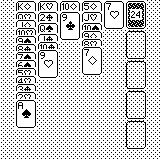 |
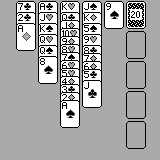 |
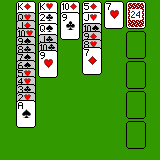 |
| Spider |
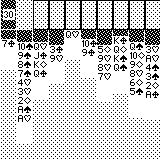 |
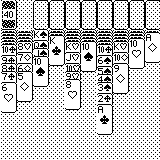 |
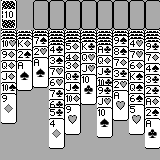 |
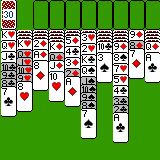 |
| Montana |
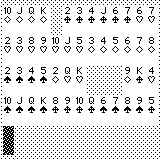 |
 |
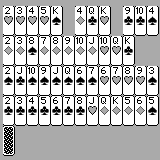 |
 |
The Games
Note: The number following some of the games is the Patience Revisited
version where that game was introduced.
-
Aces High
-
This is a very quick and simple solitaire, rarely winnable and generally
driven by the deal rather than skill. Also known as Aces Up.
-
Baker’s Dozen (5.0)
-
A challenging game where empty stacks can’t be filled and there are no
redeals.
-
Calculation
-
Keeps your mind working with modulo 13 arithmetic.
-
Canfield
-
Another classic. Foundations start at an arbitrary rank and empty tableaus
are only filled from a reserve, which must be depleted to win. This
doesn’t happen very often :-). Also known as Demon.
-
Eight Off
-
A precursor to FreeCell, but with eight tableaus and eight stocks. Almost
always winnable.
-
Forty Thieves (2.6.2)
-
A two-deck game, somewhat similar to Eight Off without the stocks. It is
difficult to win, and relies mostly on skill. Interesting at the end, as
you hope there are enough spots to “unwind” the deck far enough
to get the one card you need to continue. Also known as Napoleon at St.
Helena.
-
FreeCell
-
Another classic. Make builds in alternating colors, with eight tableaus
and four stocks to temporarily hold individual cards. 99.999% are winnable!
The game numbers in “Game Info” and “Select Game”
are the same as used by Windows FreeCell (the so-called “Microsoft
32,000”). Only one of these (the famous 11982) is unwinnable.
See
http://www.solitairelaboratory.com/freecell.html for more information on
individual FreeCell game numbers, including an excellent FAQ.
-
Golf
-
Count up and down, try to end with fewer than four cards showing. Patience
supports two variants: choose between an initial deal of 4 or 5 rows. The 4
row variant is easier; the 5 row is the classic.
Because this is a very hard game to win (the 5-card variant has
perhaps a 1% win rate), many people “play for par.” Count each game
as a “hole,” and the number of cards left in the tableau at the end
as the number of “strokes” you took to play the hole. Aim for 4 or
fewer cards left over each game. Unfortunately, Patience does not have the
means to track this “score” for you…
-
Gypsy (5.0)
-
Classic pile building game, somewhat like Spider with alternating color
order instead of strict suit order. See Miss Milligan for a
variant.
-
Klondike
-
The classic! In fact, Klondike is often what people mean when they say
“solitaire”.
-
Miss Milligan (2.6.2)
-
Like Gypsy, but only Kings can fill empty spaces, and with an extra reserve
stack that can be used to help finish up the end-game (after the dealing
deck is empty). Using this reserve, called “weaving”, can often be
used to win an otherwise lost game.
-
Montana
-
Line up all four suits from 2 to King. Tap empty spaces to highlight
the card which goes there. Tap cards to highlight where they go. Plays
nicely in landscape mode (on devices that support that).
-
Picture Gallery (2.6.2)
-
A two-deck game with three rows that build by threes (2,5,8,J; 3,6,9,Q;
and 4,7,10,K). The payoff is a collection of all the face (picture)
cards, thus the name. Patricularly nice on a high-res device, where the
face cards have a little picture.
-
Royal Cotillion (2.6.2)
-
If you play your cards right, the royal couples will line up in a dance
formation for you.
A Cotillion is an 18th century dance performed by eight people; a
winning game will end with eight Queens and Kings paired up, thus the name.
-
Spider
-
One of the most popular two-deck solitaires. Very challenging; it’s
estimated that 1 in 3 are winnable, but my win percentage hovers closer to
half that (15%).
-
Spiderette
-
A single-deck version of Spider. It seems to be less affected by
skill than spider.
-
Stalactites (2.6.2)
-
Build four piles in order regardless of suit, but each pile only holds
13 cards.
-
Tabby Cat
-
Something like a combination of a one-deck spider and FreeCell. Four
tableaus and one “tail” (stock). This is my favorite single-deck
game, and around 60% are winnable once you get the hang of it.
-
Tarantula (2.6.2)
-
A variant of spider. It’s identical regarding rules and layout, but
only two suits are used, so it is easier to create builds in suit order.
This is a good game to learn and practice spider.
-
Terrace (5.0)
-
Choose your “starter” foundation card carefully, then build the
foundations, both from the deck and a supplemental row. Also known as Queen
of Italy.
-
Towers
-
Similar to FreeCell, but with ten tableaus, and more difficult since empty
tableaus can only be filled with Kings, and tableaus build in suit order
(instead of rank order with alternating color). More than 10% of deals are
unwinnable. Also known as “Seahaven Towers™”, a
trademark of Art Cabral.
-
Vegas
-
Klondike solitaire using Vegas rules (draw one card).
-
Wish
-
A very easy game, pairs of cards matching in rank are discarded until no
cards are left. Approximately 25% of deals are winnable.
-
Yukon
-
Yukon is somewhat similar to Klondike, with a significant difference in that
a (face up) stack of cards can be moved without being in any order, so
long as the starting and target cards are in rank order and alternating color.
Also, there is no deck; all cards are dealt at the beginning.
Copyright © 2002, 2003, 2004, 2005, 2006 Paul Close
This software is released as OSI Certified Open Source under the
Artistic License (see LICENSE.txt).
http://www.opensource.org/
THIS PACKAGE IS PROVIDED “AS IS” AND WITHOUT ANY EXPRESS OR
IMPLIED WARRANTIES, INCLUDING, WITHOUT LIMITATION, THE IMPLIED WARRANTIES OF
MERCHANTIBILITY AND FITNESS FOR A PARTICULAR PURPOSE.
Source code derived from Patience 2.5.2 by Keith Packard, modified
under the terms (below) of the source code as he released it. Note: Keith
is not responsible for this version—please don’t contact him with
problems.
Palm, LifeDrive, Treo, Tungsten and Zire are among the trademarks or
registered trademarks owned by or licensed to Palm, Inc.
Copyright © 1996, 1997, 1998, 1999 Keith Packard
Permission to use, copy, modify, distribute, and sell
this software and its documentation for any purpose is hereby granted without
fee, provided that the above copyright notice appear in all copies and
that both that copyright notice and this permission notice appear in supporting
documentation, and that the name of Keith Packard not be used in advertising
or publicity pertaining to distribution of the software without specific,
written prior permission. Keith Packard makes no representations
about the suitability of this software for any purpose. It is provided
“as is” without express or implied warranty.
KEITH PACKARD DISCLAIMS ALL WARRANTIES WITH REGARD TO
THIS SOFTWARE, INCLUDING ALL IMPLIED WARRANTIES OF MERCHANTABILITY AND
FITNESS, IN NO EVENT SHALL KEITH PACKARD BE LIABLE FOR ANY SPECIAL, INDIRECT
OR CONSEQUENTIAL DAMAGES OR ANY DAMAGES WHATSOEVER RESULTING FROM LOSS
OF USE, DATA OR PROFITS, WHETHER IN AN ACTION OF CONTRACT, NEGLIGENCE OR
OTHER TORTIOUS ACTION, ARISING OUT OF OR IN CONNECTION WITH THE USE OR
PERFORMANCE OF THIS SOFTWARE.
Face cards derived from
the PySol standard
cardset, modified under the terms of the GNU General Public
License. Originals included with this distribution. The
originals are copyrighted under the GPL as follows:
Copyright (C) 1997 John Fitzgibbon
Copyright (C) 1997 Jochen Tuchbreiter <whynot@mabi.de>
Copyright (C) 1998 Markus F.X.J. Oberhumer <markus.oberhumer@jk.uni-linz.ac.at>
This code makes use of PalmResize:
http://sourceforge.net/projects/palmresize
Copyright (c) 2004, Alexander R. Pruss
All rights reserved.
Redistribution and use in source and binary forms, with or
without modification, are permitted provided that the following conditions
are met:
- Redistributions of source code must retain the above
copyright notice, this list of conditions and the following
disclaimer.
- Redistributions in binary form must reproduce the
above copyright notice, this list of conditions and the following
disclaimer in the documentation and/or other materials provided with the
distribution.
- Neither the name of the PalmResize Project nor the
names of its contributors may be used to endorse or promote products
derived from this software without specific prior written
permission.
THIS SOFTWARE IS PROVIDED BY THE COPYRIGHT HOLDERS AND
CONTRIBUTORS "AS IS" AND ANY EXPRESS OR IMPLIED WARRANTIES, INCLUDING, BUT
NOT LIMITED TO, THE IMPLIED WARRANTIES OF MERCHANTABILITY AND FITNESS FOR A
PARTICULAR PURPOSE ARE DISCLAIMED. IN NO EVENT SHALL THE COPYRIGHT OWNER OR
CONTRIBUTORS BE LIABLE FOR ANY DIRECT, INDIRECT, INCIDENTAL, SPECIAL,
EXEMPLARY, OR CONSEQUENTIAL DAMAGES (INCLUDING, BUT NOT LIMITED TO,
PROCUREMENT OF SUBSTITUTE GOODS OR SERVICES; LOSS OF USE, DATA, OR PROFITS;
OR BUSINESS INTERRUPTION) HOWEVER CAUSED AND ON ANY THEORY OF LIABILITY,
WHETHER IN CONTRACT, STRICT LIABILITY, OR TORT (INCLUDING NEGLIGENCE OR
OTHERWISE) ARISING IN ANY WAY OUT OF THE USE OF THIS SOFTWARE, EVEN IF
ADVISED OF THE POSSIBILITY OF SUCH DAMAGE.













